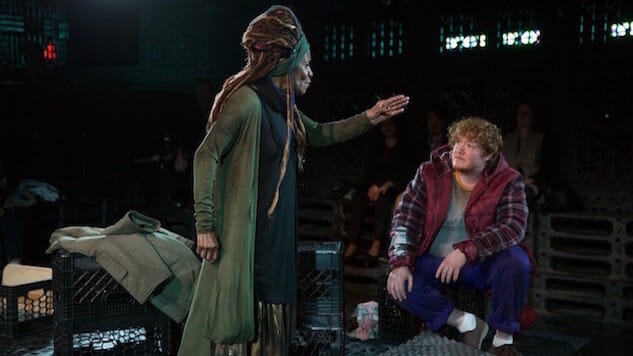Review: Samara
Julieta Cervantes
Richard Maxwell uses a stylized hyperrealism to expose uncomfortable truths and contradictions in his characters. He often casts non-professional actors, stripping away the veneer of well-made performances in favor of a raw and often awkward delivery of lines. He also usually directs his plays making his latest, Samara (helmed by Soho Rep artistic director Sarah Benson), a departure.
Benson, who’s known for wildly imaginative and transformative productions like An Octoroon, has crafted an immersive setting that sucks the viewer in like a black hole. Scenic designer Louisa Thompson has fashioned the set and audience seating out of black plastic food crates, creating a monochromatic darkness for us to trudge through with deadpan narration provided by musician and sometimes actor Steve Earle who also composed the atmospheric score.
Samara is a journey play that often feels stagnant. It opens with a young messenger (Jasper Newell) seeking to collect a debt he’s owed from a supervisor (Roy Faudree). Instead he receives the right to collect another person’s debt in a distant town. When he arrives there’s a dispute if the debt is owed and a lack of desire to pay it. In both of these situations, violence erupts suddenly and is soon regretted. There are cowboys but no clear villains or heroes. Also absent are clear resolutions.
-

-

-

-

-

-

-

-

-

-

-

-

-

-

-

-

-

-

-

-

-

-

-

-

-

-

-

-

-

-

-

-

-

-

-

-

-

-

-

-








































